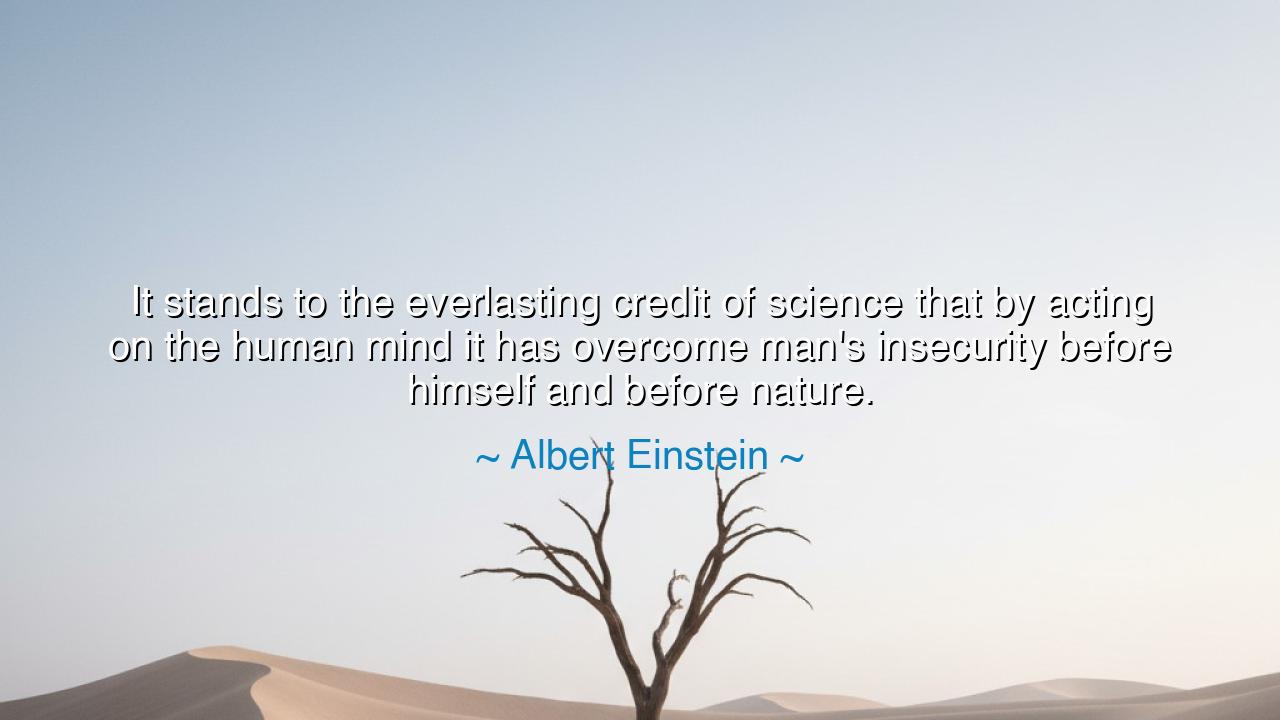
It stands to the everlasting credit of science that by acting on
It stands to the everlasting credit of science that by acting on the human mind it has overcome man's insecurity before himself and before nature.






“It stands to the everlasting credit of science that by acting on the human mind it has overcome man's insecurity before himself and before nature.” Thus spoke Albert Einstein, the prophet of relativity, whose eyes saw deeper into the fabric of reality than most who ever lived. In this solemn declaration, he gives honor not to himself, nor even to one discovery, but to science itself, the great discipline of human inquiry. For he knew that before men wielded science, they trembled—before storms, before sickness, before death, and even before the mysteries within their own souls. But through the light of knowledge, man learned to conquer fear and to stand upright in the face of both nature and self.
The origin of these words lies in humanity’s long struggle with insecurity. In ancient days, thunder was thought to be the anger of gods, plagues the curse of unseen spirits, eclipses omens of doom. The human mind, left without reason, filled the void with terror. But when men began to study, to observe, to test—when they built the first temples of science—they saw that the universe, though vast and terrible, was also ordered and knowable. By understanding, they gained power, and by gaining power, they cast aside the chains of fear. Thus Einstein proclaimed that science has acted not only upon the world, but upon the human spirit itself.
History shines with such moments of liberation. When Copernicus showed that the Earth moves around the Sun, mankind’s place in the cosmos shifted—but so too did his mind. When Newton revealed the laws of motion and gravity, the heavens were no longer filled with capricious deities but with harmony and order. When Pasteur and Koch proved that disease came not from curses but from microbes, humanity was freed from the terror of unseen wrath and given the tools of prevention and healing. Each triumph of science was not merely a conquest of knowledge—it was a conquest of fear.
Yet Einstein also speaks of the victory over man’s insecurity “before himself.” For ignorance is not only of the world outside, but of the world within. Psychology, medicine, and philosophy—when guided by science—help men understand their own minds, their emotions, their instincts. By studying himself, man ceases to be wholly at war with his desires and fears. Science gives him the courage to face his own reflection, to know that he is not a monster driven only by chaos, but a being whose thoughts and actions can be understood, refined, and guided. In this, science does not destroy mystery, but turns terror into wonder.
But let us not be deceived into thinking that science alone makes life secure. It grants knowledge and power, but it cannot grant purpose or morality. Einstein, though a man of equations, was keenly aware of this truth. He did not worship science as a god, but honored it as a light. It can overcome fear, but it cannot tell us what to love. It can cure disease, but it cannot cure hatred. It can split the atom, but it cannot tell us whether to use that atom for power or for war. Thus, its credit is everlasting in what it can do, but we, as stewards, must wield it wisely.
The ancients also understood that knowledge was the antidote to fear. The Stoics taught that fear arises from ignorance, and that by understanding nature, the wise man becomes free. The Buddha taught that to see reality as it is dissolves suffering. Einstein’s words are but the modern echo of these ancient truths: that knowledge is liberation, that understanding transforms trembling into strength.
So, O listener, take this lesson to heart: do not live in fear of the world or of yourself. Seek knowledge, honor science, and let understanding cast out the shadows of ignorance. Yet remember also that knowledge must be wed to wisdom, lest the power that frees you from fear enslave you in pride. Stand upright as a child of the cosmos, humble before its vastness, but fearless, for you bear within you the power of mind, sharpened by science, to turn darkness into light.






AAdministratorAdministrator
Welcome, honored guests. Please leave a comment, we will respond soon